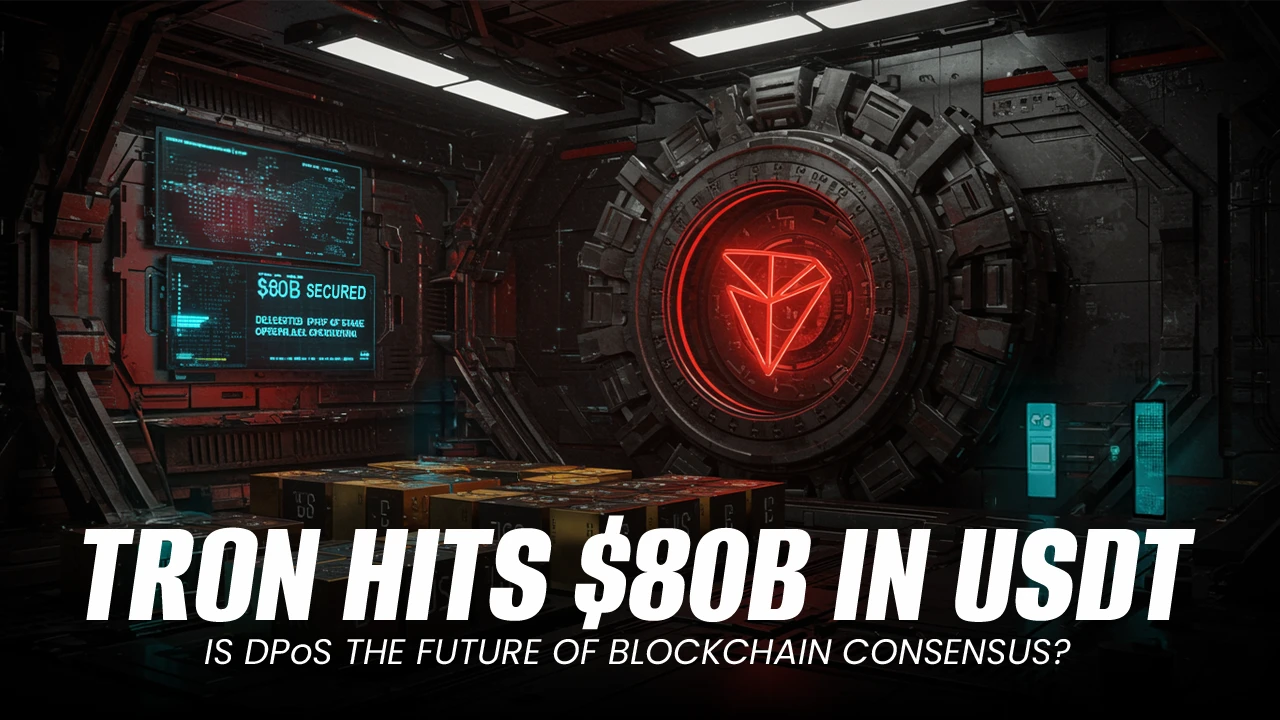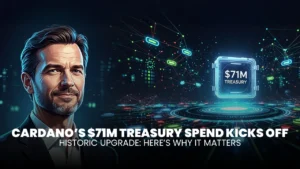How Tron’s DPoS-Powered Network Enabled $80B in USDT, Why It’s Only the Start

Two developments are shaping the conversation around blockchain scalability and governance: Tron’s commanding rise as the leading stablecoin network and ongoing technical refinements within Delegated Proof of Stake (DPoS) consensus mechanisms.
As decentralized finance (DeFi) scales toward mass adoption, Tron has surpassed an unprecedented $80 billion in Tether (USDT) supply on its network, underscoring its role as a central player in global stablecoin infrastructure. Meanwhile, institutional players such as Kraken are entering the network’s governance layer, reinforcing confidence in Tron’s consensus framework.
USDT on Tron Surpasses $80B, A Milestone in Stablecoin Dominance
In June 2025, the TRX achieved a defining milestone in the digital asset space: the circulation of Tether (USDT) on Tron exceeded $80 billion, cementing its position as the most dominant stablecoin network globally. This figure represents more than 60% of USDT’s total supply, far surpassing Ethereum’s share and illustrating Tron’s increasingly central role in global digital settlements.
The $80 billion figure is not an endpoint; it is a signal. Tron has not only demonstrated the practical utility of Layer 1 blockchain infrastructure but also validated the DPoS model at a global scale. As stablecoin adoption continues to grow, TRX’s example may set the precedent for other Layer 1 networks aspiring to combine economic velocity with structural integrity.
As blockchain ecosystems mature, the need for consensus mechanisms that balance decentralisation with real-world performance has never been more critical. Delegated Proof of Stake (DPoS) is increasingly emerging as the architecture of choice for high-throughput, governance-aware Layer 1 blockchains. With its ability to deliver rapid block finality, reduce energy costs, and integrate direct stakeholder accountability, DPoS represents a pragmatic evolution in decentralized coordination.
Kraken Elected as Tron Super Representative, A Vote of Institutional Confidence
In a move that underscores the maturing institutional footprint within decentralized ecosystems, Kraken, one of the world’s most prominent cryptocurrency exchanges, was recently elected as a Super Representative (SR) on the Tron network. This development, officially announced by both Tron DAO and Kraken, marks a notable shift in how governance roles are being adopted by regulated, centralized entities within decentralized infrastructure.
Under Tron’s Delegated Proof of Stake (DPoS) model, Super Representatives play a critical role in maintaining network operations. They are responsible for validating transactions, producing blocks, and actively participating in the governance of the protocol. To earn this position, candidates must be voted in by token holders, an election process that reflects both technical capability and community trust. Kraken’s successful campaign demonstrates that large-scale service providers are no longer on the periphery of blockchain consensus but are becoming core stakeholders in protocol health. While TRX’s success offers a powerful case study, the broader Delegated Proof of Stake (DPoS) landscape is evolving with equal significance.
Final Thoughts
As blockchain technology continues to scale into mainstream infrastructure, the developments within the Tron network and the broader DPoS ecosystem are anything but incidental; they are directional. Tron’s $80 billion USDT milestone, coupled with the onboarding of institutional validators like Kraken, demonstrates the real-world viability of Delegated Proof of Stake at both the technical and economic levels. These accomplishments are not mere statistics; they reflect a maturing consensus design capable of handling global financial flows with speed, reliability, and transparency.
FAQs
- What is the significance of TRX surpassing $80 billion in USDT?
Tron’s $80B USDT milestone makes it the top network for stablecoin activity. It reflects high network throughput, low fees, and strong adoption, particularly for cross-border payments in emerging markets.
- How does Delegated Proof of Stake (DPoS) work on TRX?
Tron uses DPoS to elect Super Representatives who validate transactions and produce blocks. Token holders vote for these representatives, enabling a governance model that is both decentralized and efficient.
- What role does DPOS play in the blockchain ecosystem?
DPOS serves as a neutral resource hub, offering insights into DPoS-based governance models, protocol upgrades, and network analytics. It tracks the evolution of DPoS across multiple Layer 1 blockchains.




